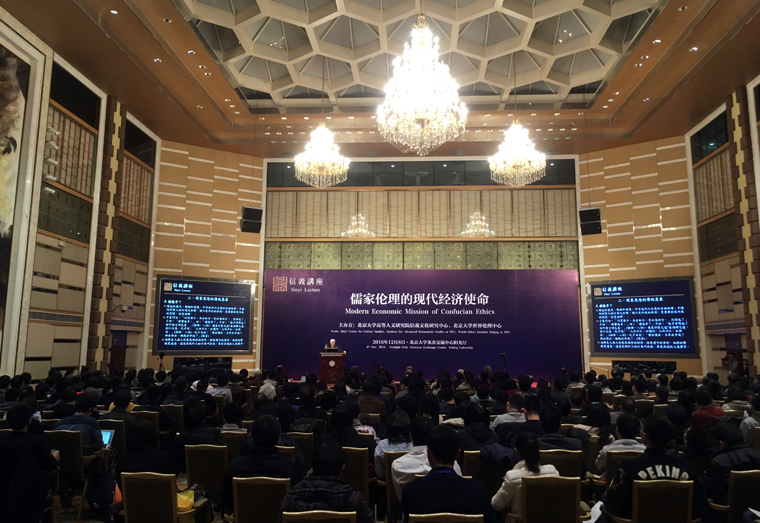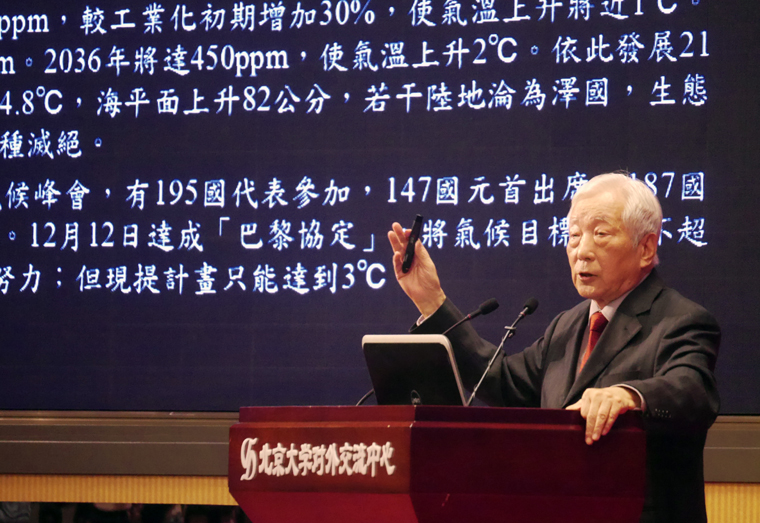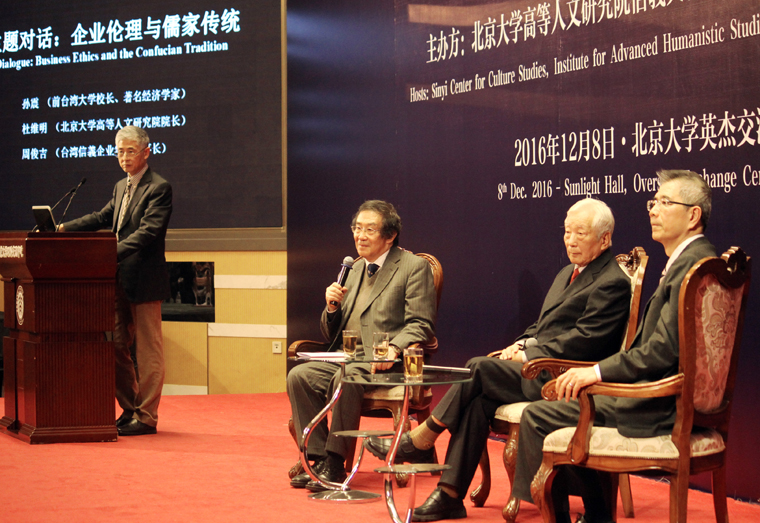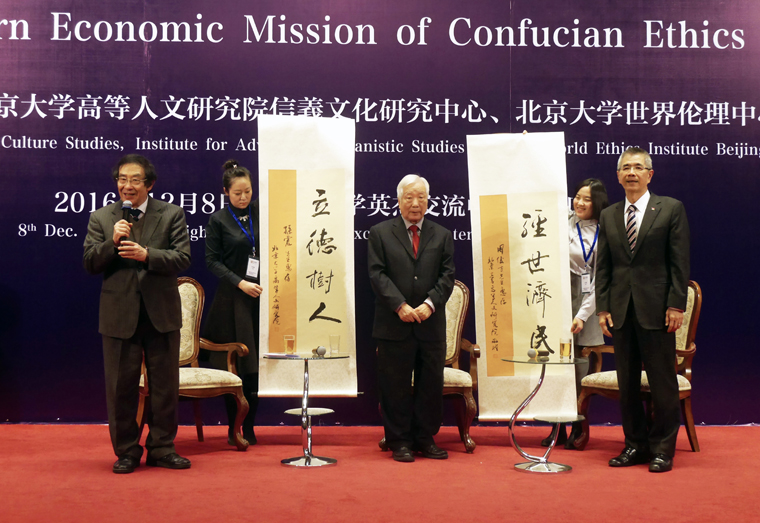




Hosted by the Sinyi Center for Culture Studies at the Institute for Advanced Humanistic Studies (IAHS) and by the World Ethics Institute Beijing (WEIB) at Peking University, the 1st Sinyi Lecture took place on December 8, 2016. Sinyi Lecture provides a platform for advanced exchanges and dialogues around the theme of the modern destiny, mission, and transformation of the Confucian tradition in the business context. It invites distinguished scholars and business leaders to discuss topics relevant to business practices, with the hope to span across disciplinary boundaries, to close the gap between theory and practice, and to uncover, enrich, and apply traditional Confucian resources in spirituality, morality, ethics, and social institutions to business. The lecture aims at advocating and broadening the value of ren (human-heartedness or humanity), and promoting exploration and construction of a new business ethics under the perspective of spiritual humanism.
Prof. Sun Chen, former President of National Taiwan University and a renowned scholar of economics, was invited to be the speaker of the first Sinyi Lecture. After his speech, Director of IAHS at Peking University Prof. Tu Weiming and Board Chairman of Sinyi Realty Mr. Chou Chünchi joined Prof. Sun for a dialogue on Business Ethics and the Confucian Tradition. Executive Vice-director of IAHS Prof. Ni Peimin presided over the lecture, and Vice President of PKU Prof. Wu Zhipan attended the lecture and delivered welcome remarks on the arrival of Prof. Sun Chen and Mr. Chou Chünchi with his delegation from Taiwan. Eminent scholar Prof. Liu Mengxi was also present at the event as an invited guest.
The first part of the event was Prof. Sun Chen’s keynote speech on the topic of Modern Economic Commission of Confucian Ethics. He mentioned in the lecture that Confucianism was formed 2,000 years ago during the time when economy was in stagnation and people’s welfare came from the society’s being harmonious and peaceful. However, modern western thoughts generated in an era of economic development about 200 years ago believed that, in addition to social harmony and peace, people’s welfares must come from economic growth and the increase of both people’s income and wealth. There is, however, no conflict between the core ideas of these two sets of thoughts.
Prof. Sun explained that Adam Smith once said, being concerned about one’s self-interest will lead to the virtue of prudence, and caring for other’s benefits will generate the virtue of justice and benevolence. In terms of ethical principles which modern enterprises should adhere to, Prof. Sun suggested that business ethics should contain four principles: First, ren (humanity), which means loving people. Enterprises need to go beyond their own interests and take the survival and development of the human race into consideration. Second, yi (justice or appropriateness), which aims at providing fare treatment of the interests of all the relevant parties, such as stockholders, managers, and customers. Third, cheng (sincerity), which means that enterprises must neither deceive themselves nor deceive others, and never do anything against their own conscience. Fourth, xin (trustworthiness), i.e. enterprises should maintain good reputation and being trustworthy.
The second part of the event was a dialogue on Business Ethics and the Confucian tradition participated by Prof. Sun, Prof. Tu and Mr. Chou. Prof. Tu pointed out that since 2013, the communities of Cultural China which includes mainland China, Hong Kong, Taiwan, Singapore, Macao and even the entire East Asia have reached a consensus that the increase of GDP could not be the only measure for the development of China and its interaction with the world. Besides the economic progress, we need to put more emphasis on considerations about politics, social and culture development, and environmental protection.
Prof. Tu emphasized that comprehensive development of a human being should include the following dimensions – the dimensions of one’s relationship to oneself, of human relationships, of the relation between human and the natural world, and of the relationship between humans and the way of heaven. There is a choice in dealing with values such as freedom, rationality, rights, rule of law, and various dignities. That means between yi (justice) and li (profit), yi must take priority. Without justice, the pursuit of profit will become indulgence. In emphasizing rights, we must emphasize responsibility; when talking about rule of law, we must emphasize ritual propriety; when talking about human dignity, we must emphasize social harmony; when talking about freedom, we must emphasize social responsibility. He indicated that broadening these values from within, especially in the realm of businesses, may create an opportunity for the turn of human civilizations.
Mr. Chou Chünchi, board chairman of Taiwan Sinyi Realty, also shared his experience of implementing business ethics. Chou said that in making management decisions, most enterprises would consider how to increase profits for the company and how to promote maximum benefits for their stockholders. However, about five or six years ago, Sinyi Realty pioneered in the business circle in setting up a position called “ethics manager,” which is responsible for developing education programs in the business and to promote the concept of justice. Since then, the most significant and the highest decision-making body of the enterprise became the Ethical Management Committee of the business.
“We set for ourselves five major parties that we must be responsible to: our customers, colleagues, stockholders, the public, and the natural environment,” Chou said. “Every significant proposal must be examined through the perspective of these five major parties. Besides the Ethics Manager, staffs from other departments must also review the proposals. A proposal may help the company to earn money and add values for our customers, yet if it may be harmful to the environment or may cause a disturbance to the community, we would examine it and, if it turns out that the proposal is not in accord with the ethical standard, we will withdraw it and propose a new one.”
Chou believed that there are three important pillars in business management: the first is being people–oriented; the second is to put yi (justice or appropriateness) before li (profit); and the third is positive thinking, meaning to understand the demand and plan of the government. Chou pointed out that running business in this way will not reduce the profit of an enterprise. In fact since the establishment of his company, its capital has increased 20,000 times.
After the dialogue Prof. Sun, Prof. Tu and Mr. Chou opened the floor and responded to the questions from the audience. Then Prof. Tu presented gifts to Prof. Sun and Mr. Chou on behalf of IAHS, which are two pieces of Chinese calligraphy written by Prof. Ni Peimin (Executive Vice-director of IAHS). The event ended with warm applause from the audience.

Copyright@2014Institute for Advanced Humanistic Studies,PKU 京ICP备案1253235 Address: 4 Bldg,Lee Shau-kee Humanities,PKU,5 Yiheyuan Rd.,Haidian District,Beijing.